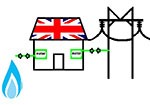BEIS has published its latest statistics on the UK’s “smart” meter installation programme.
After the third quarter of 2016, there were just over four million meters in dwellings being “operated in smart mode” by large energy suppliers – 8% of their total customer base. Figures for smaller companies are proving more difficult to collate. One in five of all new non-domestic meters (gas and electric) operated by large energy suppliers are also now estimated to be operating in smart mode or with advanced functionality.
This brings the total number of so-called smart meters currently operating in British homes and businesses to approximately 4.89 million.
The original ambition was that 53 million of such meters would be installed by the end of 2020 but there have been numerous delays.
Critics of the plan have complained that the costs of installation will outweigh any savings consumers might make and that without widespread variable tariffs there is little scope for shifting demand-side response. In addition, there are concerns that by the time all homes are fitted with existing technology it will be obsolete. Plus, of course, the expected lifespan of the new meters is substantially shorter than that of the meters that are being replaced.
The UK does have some variable tariff options, with about 16% of the population taking advantage of lower overnight tariffs where they are available. There have been two more recent offerings from energy suppliers: one of a cheaper daytime rate for Saturdays or Sundays, the other of much cheaper overnight rates on weekdays only.

